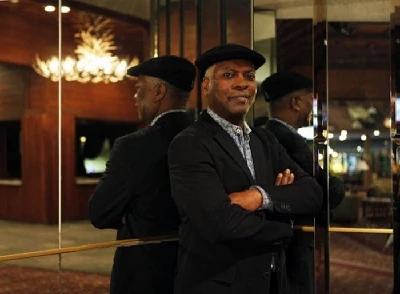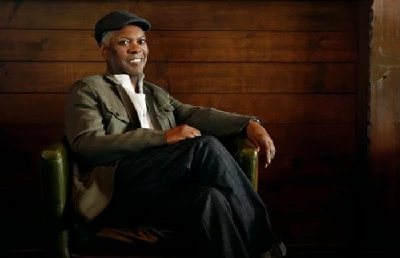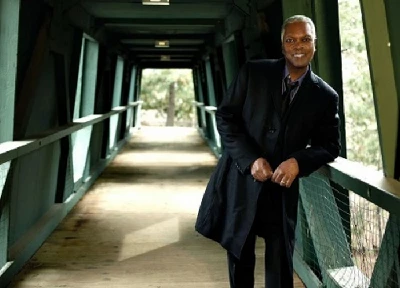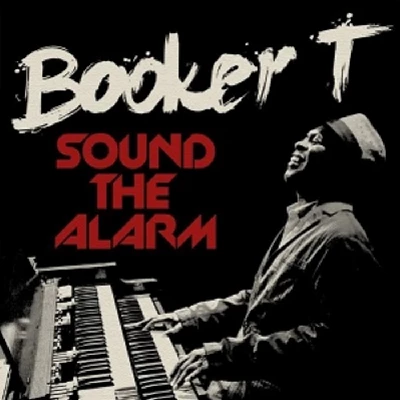published: 31 /
7 /
2013
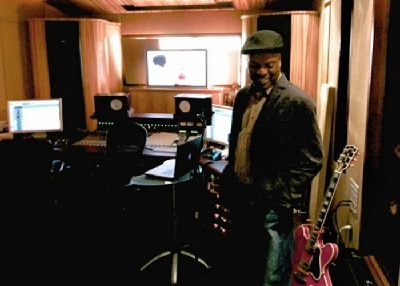
Lisa Torem speaks to legendary organist, arranger and producer Booker T. Jones about his Memphis/Stax Label influences, his creative collaborations with contemporary artists and how 'Sound the Alarm', his tenth and latest studio album, reaches firmly into the past, yet celebrates the present
Article
Emerson once wrote, “The creation of a thousand forests is in one acorn.” Booker T. Jones is a musician whose personal history rivals his musical legacy. Blessed with a strong family foundation, this prodigy achieved his musical goals through talent and hard work yet each step along the way seemed like serendipity, almost like an act of nature.
Jones played church organ in Memphis but also picked up the bass, several reed and brass instruments and piano. He attended Booker T. Washington High School, where other future musical legends, like songwriter William Bell, who would later co-wrote with Isaac Hayes, passed through the halls.
One example of kismet was when Jones met an employee of Satellite Records (before it became Stax Records), Steve Cropper. Both would embark on an amazing journey working at Stax, writing and performing with Al Jackson Jr. and Donald “Duck” Dunn. Their work as session musicians meant performing with soul giants like Eddie Floyd, Wilson Pickett and Sam and Dave. The bluesy ‘Born under a Bad Sign’ would later be covered by Albert King and Cream.
In the 1970s, Jones relocated to California and he and his band the M.G.’s completed their final album together, ‘Melting Pot’, an album which continues to inspire top recording artists.
Jones has also worn a producer’s hat. His achievements include Bill Wither’s debut, ‘Just As I Am’ and Willie Nelson’s ‘Stardust’. In the mid-1990s, Booker T. and the M.G.’s received their first Grammy for Best Pop Music Instrumental Performance for ‘Groovin’’. Earlier in that decade, they were inducted into the Rock and Roll Hall of Fame and in 2007 received a Lifetime Achievement Award.
Yet it looked like Booker T.’s solo career was just getting started. He released ‘Potato Hole’ with Drive-By Truckers, featuring Neil Young in 2009, where he was awarded another Grammy for Best Instrumental.
Two years later, he received another Grammy in the Instrumental Category for ‘The Road’ to Memphis, an album, which celebrates the rich musical heritage flowing from his native city, featuring the Roots, Motown’s Dennis Coffey and Lou Reed.
On his latest recording, ‘Sound the Alarm’, Booker is again joined by a talented ensemble. He covers all the bases with world-class percussionists, R & B and hip-hop artists and original material, which revitalizes the spark of an earlier time, yet also furnishes an eye for the future.
Last year, Booker T. Jones returned to his alma mater, Indiana University, where he was presented with an honorary doctorate. When he spoke to the student body, he spoke from the heart or maybe he even channeled his grandfather’s heart.
Vintage Trouble chimes in about what it was like meeting and working with Booker:
Vocalist/songwriter Ty Taylor says, “We were more than familiar with Booker T. songs. We knew his story. He and all the Stax artists that went to Europe in 1967 for the Stax Volt tour have been our heroes. We modelled our early decision to take our brand of rhythm and blues to the UK on their lead. When he walked into our dressing room, I was ironing my shirt and fell to my knees. I was so blown away that it took me a second to be able to look into his eyes.”
Bassist Rick Barrio Dill adds, “The great thing about working with Booker was that it was so organic and seamless with respect to the way we work normally. Ty completely had in mind where he wanted to go with the vocal and the lyric, and came in and delivered it exactly like a normal Vintage Trouble writing or recording session. It really was a match made in heaven with Booker because everything fell into place so naturally.”
Booker T. Jones has developed quite a remarkable community. In an intimate talk with Pennyblackmusic, he discussed his inspirations, challenges and how colouring outside the lines is simply second nature.
PB: Booker T., you have a fantastic personal history as well as musical history. On your paper route as a young man, you passed by the house of pianist Phineas Newborn. What did you hear coming out of his house and how did that inspire you?
BT: The paper route was in front of a church on Mississippi and Austin, and his house was the first house on my left. He wasn’t a normal pianist. I am a normal pianist. I go and I practice scales. He didn’t need to do that. He practiced songs.
To start my paper route, I would have to walk past his house, which took some will and strength rather than just listening because the screen door was open. There were certain kings and princes of music in Memphis. Fred Port was one of the saxophonists and pianist Phineas Newborn was one. There was a society of unbelievably excellent musicians at that time. Charles Lloyd was a member of that society as was Joe Dukes – people who were just up there in the clouds. It was a privilege to be physically close to them and to be able to hear what they did.
PB: Your grandfather built his own school.
BT: My grandfather was a strong man. He was one of the first, maybe one of the only black men I knew to own land in Marshall County, Mississippi. Now he was a teacher and I’m not sure how he got his education, but all of his children went to college and that became my duty also, to go to college and develop my mind.
PB: Now, you made the decision to go to college when other people were asking you why. Your career was taking off. ‘Green Onions’ was a hit and you already had a bright future ahead of you. Was it the right decision?
BT: It was definitely the right decision for many reasons. Back then, they were trying to start a record company. We didn’t have exactly the same values. Money was king to them. I fooled them into thinking I was better than I was, but in my mind I knew I needed training. I couldn’t play what I was hearing in my mind. I was no Phineas Newborn, so I needed people to tell me how to do certain things and so I definitely did the right thing. I flourished when I went to college whereas I might have languished had I not.
PB: When giving a speech to your alma mater, you shared some personal philosophies about the benefits of starting from the bottom.
BT: My grandfather cultivated not only the soil, but he wanted to cultivate the mind and I’ve tried to learn what wisdom consisted of.
PB: On the last M.G’s album ‘Melting Pot’ you performed with Steve Cropper, Donald Dunn and Al Jackson. I really loved ‘Chicken Pox’ and ‘Kinda Easy Like.’ What were your favourites?
BT: That was a bit of a struggle. We had some disagreements amongst the group. The band had had success with its old sound so everybody was happy with the status quo, but me. It was difficult, so everything on that album is my favourite. Let’s get it done, and to get it done with a new sound like that in 1971 was a real challenge. But once we got into it everybody really kind of loved the new direction. I love all of those songs, actually.
Of course, ‘Melting Pot’ was the apex of the session – one of my favourite ones.
PB: And it’s been covered so many times since…
BT: My drummer really came through with that new sound. It became a hip-hop rhythm. It became the definition for a lot of hip-hop.
PB: I’ve been to Memphis and I found ‘The Road to Memphis’ to be a touching tribute. I think you captured the small town feel of the city as well as its cultural history. How did you choose the guest artists for this album?
BT: We did the album in New York City. It’s based along the feelings of New Orleans jazz and hip-hop – people who really appreciated that like Lou Reed, who liked the band from the early 1960s. He was an odd guy in that he was a Booker T. and the M.G.’s fan. Sharon Jones had been a friend and a fan, who we jammed with. She’s from Brooklyn.
PB: I’m not sure how many people are aware that Booker T. and the M.G.s did an ‘Abbey Road’ tribute album, in 1970, which was named after a famous street in Memphis. You even had the quartet pose the way the Beatles did on the cover.
BT: Once again, that was a stretch. At the time, it was not financially viable for the company to do it. But, to me, the Beatles had just reached the summit of music on ‘Abbey Road’, and so ‘McLemore Ave.’ was a tribute to that. It was even called the ‘Abbey Road’ album, which I love.
PB: You’ve worked with some artists that we wouldn’t ordinarily pair up with you, like Neil Young or Drive-By Truckers, but you’ve gotten some astounding results.
BT: If you look at Neil’s career, he is a very inspiring songwriter and entertainer. The songs that he wrote, ‘Only Love Can Break Your Heart’, just that one alone, is such a gem and he’s such a beautiful guy. He became such a good friend. I don’t stay in my slot. I just don’t.
PB; Now at this point in your career you can easily do it all: produce, play a variety of instruments, sing and write yet you’ve once again enlisted a number of guests in ‘Sound the Alarm’. You made the choice to create an ensemble project.
PB: Ty Taylor of Vintage Trouble and Anthony Hamilton both sing heartfelt ballads. Did you handpick these artists?
BT: Yes, with the help of my friends. John Burk (co-producer of ‘Sound the Alarm’-Ed) introduced me to Ty Taylor through Joss Stone. Because the minute I saw and heard them – we were in the same room – we had the chemistry, and he knew it and I knew it. It was just a matter of time to get us together.
The thing I loved about Ty was here’s a young guy, and I could be the same way that I was in 1963 or 1964 with him and the whole band. It’s not just him; it’s the whole band. We just started writing, and in six hours we had a song.
PB: ‘Father Son Blues’ is exactly what the title says. You’re performing here with your son, Ted, who is a guitarist. When I listened to the guitar work, I felt like I was listening to a human conversation. It was that way too with Gary Clark, Jr. There are some very soulful and human sounds coming out of the dialogues.
BT: That’s a tribute to my kids – Gary, I’m going to call him my son now. They talk to me with their instruments, and they communicate with me that way in real life too. It’s a real relationship, and it’s great when that comes out in the music.
PB: You also work with Mayer Hawthorne who contributes a contemporary sound, but in the jam ‘Fun’ you take us back to the Stax sound.
BT: A lot of things about music – we were doing such cool things back in the 1960s and 1970s. There’s no real reason to abandon that just because it’s 2013. A lot of people appreciate that so there are a lot of present day R & B bands, including Mayer Hawthorne and the Avila Brothers and Darryl Hall – people who just love the sound of R & B.
So R & B is growing up, too. It doesn’t have the profile that rock or classical or country or jazz does, but it’s still with us and these are the folks who kind of gathered around me for this album. So I’m fortunate. It’s like a magnet. They just came to me. It was amazing, to tell you the truth, that they just came to me in my life. I looked up and the people were there. I looked up and Anthony Hamilton was there.
I was at Cupertino at the Apple Store, and there was Gary Clark in my own dining room. It was just great for me that I didn’t have to go searching.
PB: You had played with Poncho Sanchez back in the Stax Records days.
BT: Yeah. Eddie Floyd and I worked on his previous album. He’s the
friendliest guy and he’s such a good friend. I credit him for carrying on the torch from Mongo Santamaria and Tito Puente and keeping the standard there.
PB: Was it challenging to come up with all new material for ‘Sound the Alarm’?
BT: Writing can be work but it’s the work I do. That’s why I’m here. You have to have the patience and the faith to be a songwriter. The painful part is not knowing until you arrive at a certain place that you’ve got something – it is kind of like walking in the dark. I’m finding out how to follow my grooves. I wrote the song, ‘I Love to Watch You Sleeping’ because I read in a magazine about how people like to hear about intimate things in their books and their artwork. What’s more intimate than watching someone sleeping?
PB: Kori Withers does a beautiful job on that ballad. Had you done a vocal duet before?
BT: Not since Carl Thomas. Carl Thomas and I did a TV show in the 1960s, and we did the Beatles song ‘Yesterday’ together.
PB: Do you have any memories about working with Wilson Pickett or Otis Redding in the Stax days?
BT: That whole period was just an unexpected, star-studded journey for me at a young age. I grew up learning how to play music and sitting next to Otis and Steve Cropper and Al Jackson, then getting on stage with Sam and Dave and Eddie Floyd. Those experiences were so high for me, but they were learning experiences too so I was just enjoying myself and figuring it out at the same time.
PB: If you could go back in time and jam with some musicians, who would you hang out with?
BT: Who would I hang out with? I would bring Otis Redding and Sam and Dave back and go back to that old train station we played at in London, which started off the biggest jolt of electricity I ever felt in my life in music, playing music that we had recorded. Yeah, I would bring them back. Arthur Connelly, yeah. I would step off the stage and watch that show if I could.
PB: Like an out-of-body experience. That would be cool. What about touring?
BT: Soon we’re going to Ronnie Scott’s in London. We have such an incredible group of people with me, and we have such good music to play. It’s fun. It’s great.
PB: What would you say to Jack McDuff or Blind Oscar if you could?
BT: I would say about twenty times, thank you for being dedicated, thank you for doing what you did because it helped me and inspired me in what I needed to do. Thank you for being everything.
To Blind Oscar, who I listened to while standing on the street, I would say, “You were 100 percent and thank you for that,” and the same for Jack McDuff.
PB: What’s a Jack McDuff song that we might want to hear?
BT: I can’t name a song, but it was more of a style. I think he was writing songs in every set when he sat down. It was his attitude. He was a bad boy. He was one of the reasons Michael Jackson was able to turn the meaning of the word “bad” around. He was so good. The intention was so purposeful. He was 100 percent on this earth, doing what he was doing. It touched you right in your heart.
PB: Thank you.
Picture Gallery:-
